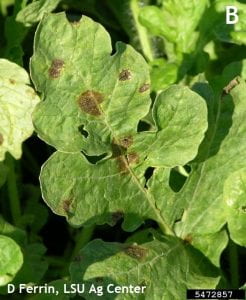Kate Everts, Vegetable Pathologist, University of Delaware and University of Maryland; keverts@umd.edu
Gummy stem blight (caused by Didymella bryoniae) is the most important foliar disease of watermelon in Maryland and Delaware. The disease affects leaves, stems and vines of watermelon (Fig. 1). Anthracnose (Fig. 2), which is caused by Colletotrichum orbiculare, also occurs yearly. In Maryland and Delaware, yield losses due to gummy stem blight and anthracnose can reach 100% when the environment if favorable to disease development, and if no fungicides are applied.

 Figure 1. Gummy stem blight on the petioles (A) and leaves (B) of watermelon. Photos courtesy of Bugwood.org
Figure 1. Gummy stem blight on the petioles (A) and leaves (B) of watermelon. Photos courtesy of Bugwood.org
 Figure 2. Anthracnose lesions on cucurbits are angular in appearance. Tiny black spots can be seen through a hand lens in the tan centers of lesions. Photo courtesy of Bugwood.org
Figure 2. Anthracnose lesions on cucurbits are angular in appearance. Tiny black spots can be seen through a hand lens in the tan centers of lesions. Photo courtesy of Bugwood.org
MelCast is a weather-based spray advisory program for watermelon developed at Purdue University. The program uses hours of leaf wetness and temperature during leaf wetness periods to determine when a fungicide should be applied. Weather information is “fed into” the program three times per week and the program indicates how favorable weather is to the development of gummy stem blight or anthracnose. The output of the program is an “environmental favorability unit” (EFI) for each day. The EFI values are added together. Once the threshold of 30 EFI is reached, a fungicide application is recommended. In Maryland and Delaware we have reduced the time between applications (i.e. reduced the EFI value that triggers a spray recommendation). After the fungicide application, begin adding the EFI again. If two weeks elapse and you have not accumulated 30 EFI, spray anyway. Also, add 2 EFI for each overhead irrigation event. We currently run MelCast for three locations in Delaware (Coverdale Crossroads, SE Laurel, SW Laurel) and five locations in Maryland (Galestown, Hebron, Salisbury, Waldorf and Woodbine).
To use MelCast on your farm, please call Karen Adams at (302)856-7303 and give us your name and Fax number or e-mail address. More details about how the program works are available at our Disease Forecasting Web page, which is at a new location this year:
http://extension.umd.edu/mdvegetables/vegetable-plant-diseases/disease-forecasting . Select the location that is nearest to your farm. In addition, we post the MelCast Advisory online three times a week.
